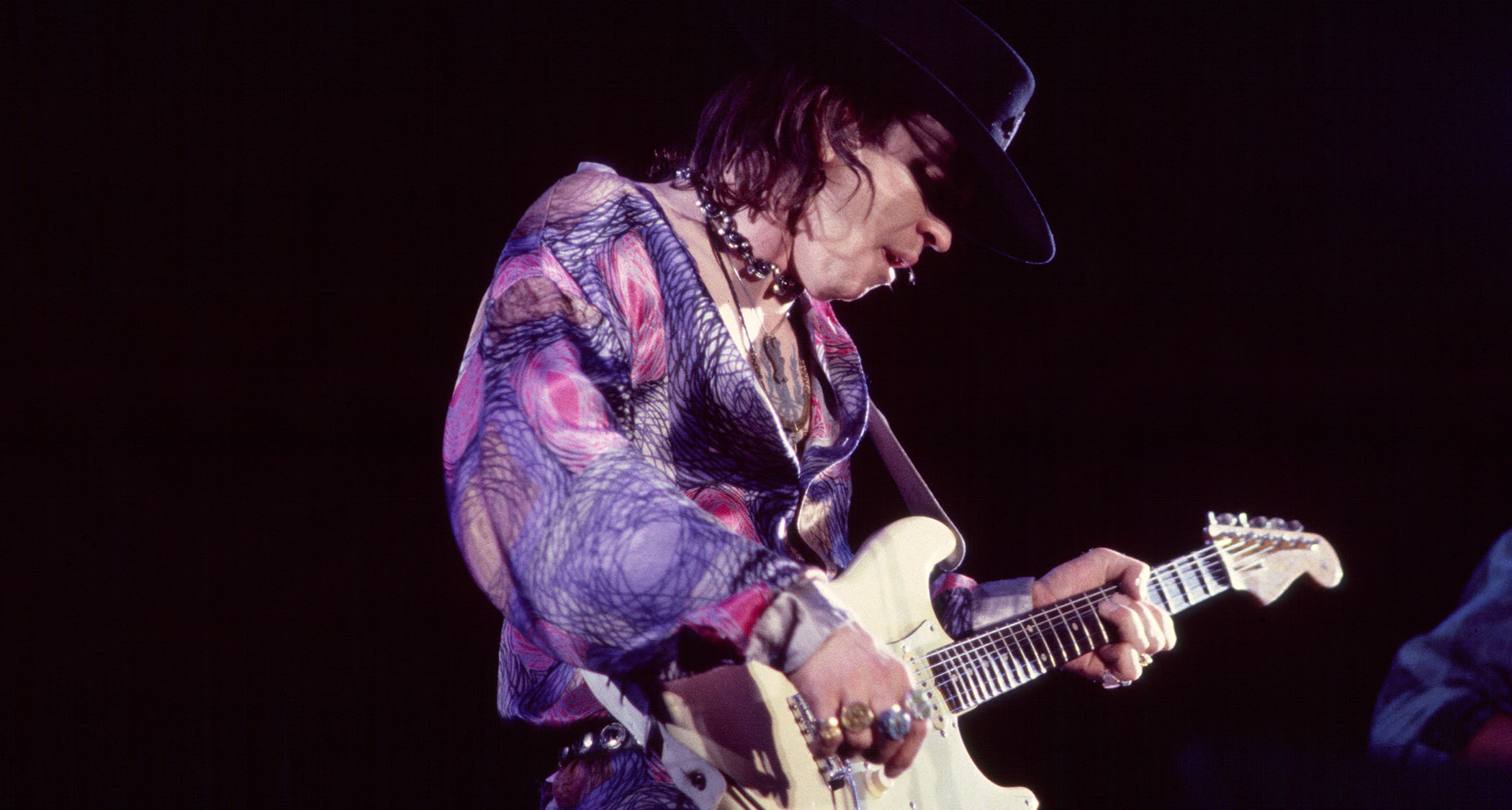Guitar World Verdict
These well-considered, beautifully assembled new models encapsulate everything that's great about Gretsch, and rank among the very best guitars the company has produced.
Pros
- +
G6120T-BSSMK: Breathtakingly beautiful as ever but this time we’re just as taken with the fantastic playability; the Ray Butts pups are completely outstanding, too
- +
G6120T-HR: The new Hot Rods look, play and sound the absolute balls; Setzer’s signature pickups provide the perfect balance of warmth and snarl
Cons
- -
G6120T-BSSMK: We had to send it back – that was the only downside for us...
- -
G6120T-HR: Some may find the stripped-down wiring loom a bit limited
You can trust Guitar World
It was almost a year ago that we caught up with undisputed king of rockabilly guitar, Brian Setzer. The occasion was the launch of the Stray Cats’ reunion record, 40, the blistering and aptly named celebration of their four decades in the rockabilly and pompadour business.
We talked gear of course, and Brian let slip he was working on some new Japanese-made signature models with the team at Gretsch. To say we were intrigued is the very definition of an understatement. We turned a metaphorical lamp in Brian’s direction and began applying the thumbscrews.
“For me, it has to be a new model,” he told us. “It’s not just slapping a new coat of paint on it. You know, ‘Here’s a new model. It’s red!’ That’s what all the guitar companies seem to do. ‘It’s the new neon Les Paul. It’s got neon lights around it.’
“I want to change quite a few things when I’m involved with a new guitar. I’ve shot down quite a few ideas, but every little tweak we make seems to improve them.” That’s all we got. Mere crumbs.
Brian Setzer doesn’t fold under questioning. We were left to operate what former British prime minister John Major once described as “a wait and see policy...” The good news is the cats are out of the bag at last.
I want to change things when I’m involved with a new guitar… I’ve shot down a few ideas
Brian Setzer
The rebooted Gretsch Brian Setzer line-up kicks off with a couple of Nashville models, in Black and Smoke Orange nitrocellulose lacquer finishes.
The popular stripped-down Hot Rod guitar is being shipped in four new gloss poly colours: Candy Blue Burst, Lime Gold, Candy Magenta, not to mention the fantastically named Extreme Coolant Green Sparkle.
All the latest guitar news, interviews, lessons, reviews, deals and more, direct to your inbox!
As you can see from the photos, we took delivery of the Smoke Orange G6120TBSSMK Nashville ’59 and a Candy Blue Burst G6120T-HR Hot Rod. Both these G6120s, and the other guitars in the range, are based around the modern (2.5-inch) deep laminated maple hollow-body design with trestle bracing.
You might recall that Brian, and Gretsch alumni Mike Lewis, had his original ’59 Stray Cats G6120 run through a (no pun intended) CAT scan machine to see what was going on inside. The ’59-era trestle-style bracing the x-rays revealed has been replicated in Brian’s signature guitars for years.
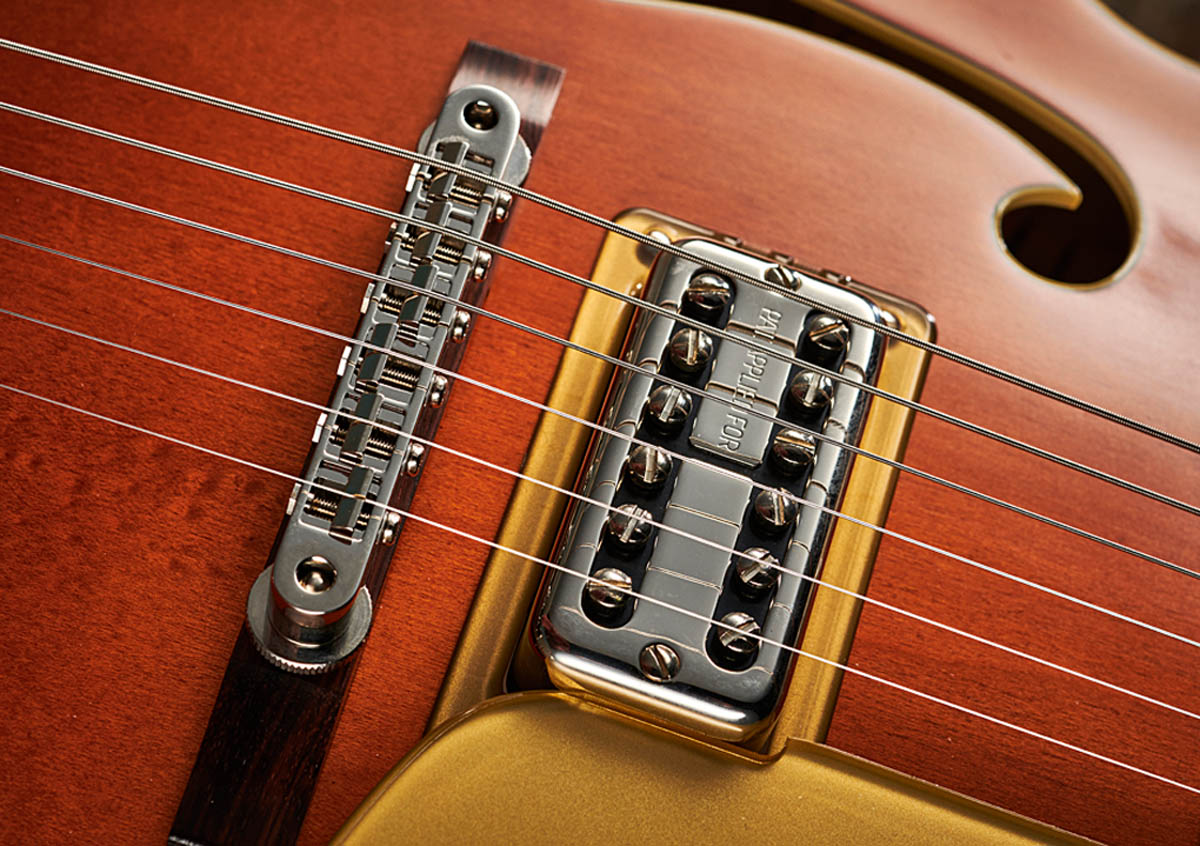
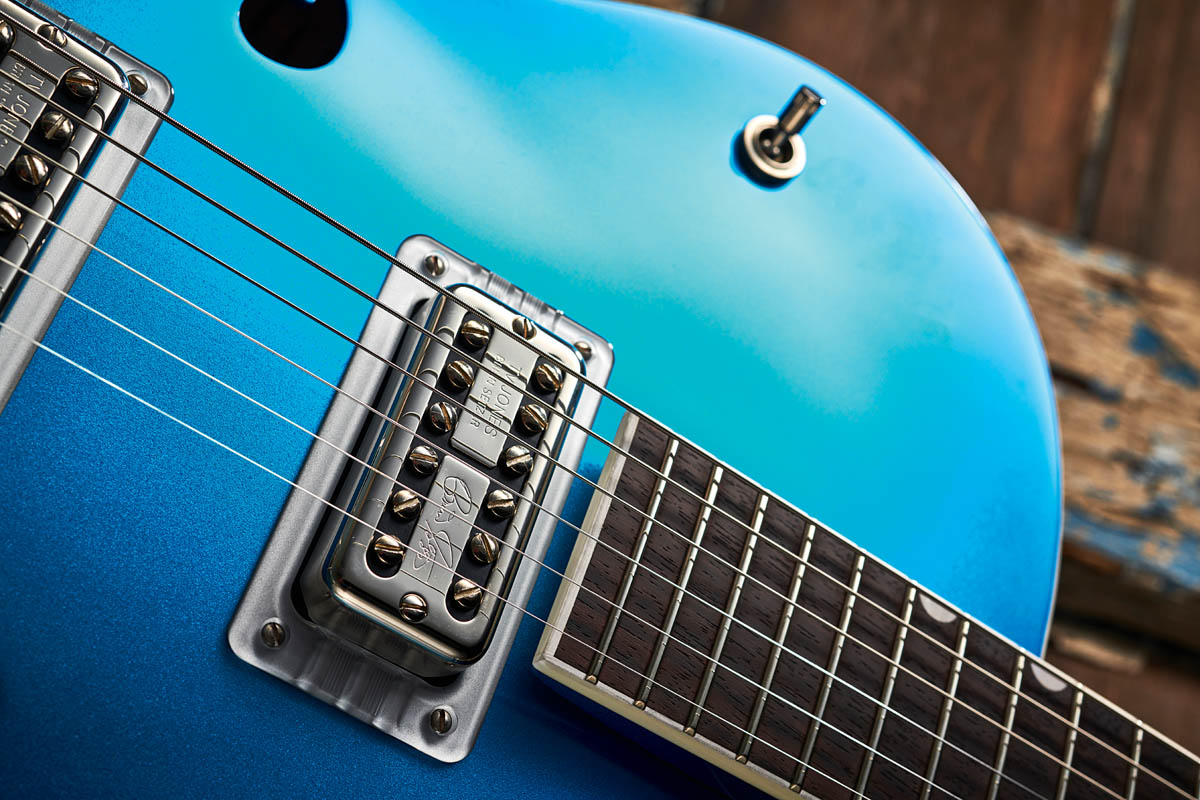
Other shared features here include a set 625mm (24.6-inch) scale neck, plus 22 medium jumbo frets and cute pearloid ‘Neo-Classic Thumbnail’ inlays on a 241mm to 305mm (9.5- to 12-inch) compound radius fingerboard. To clarify, you’ll encounter an ebony ’board on the Nashville ’59 and a rosewood slab on the Hot Rod.
Hardware spec is the same for both models. That’s a nickel Adjusto-Matic bridge with a pinned rosewood base to prevent any movement while operating the Bigsby B6C True Vibrato unit. Locking Gotoh tuners cope admirably with tuning stability duties.
The pickups on both guitars are wound and supplied by TV Jones. The Hot Rod has a set of Brian’s own signature Filter’Tron humbuckers; The Nashville ’59 features a pair of Ray Butts Ful-Fidelity model pups (see ‘Who is Ray Butts?’ boxout, opposite).
The wiring looms differ, too. The Nashville has a volume for each pickup, the classic Gretsch master volume and the three-way pickup selector toggle switch. You also get the old-school three-way preset tone toggle.
The Nashville’s Smoke Orange nitro lacquer has a semi-gloss finish that looks immensely cool and proves you don’t have to kick a guitar’s spleen in to pull off an aged vibe
As befits its cool stripped-down concept, the Hot Rod gives you nowt but a gear shift and a gas pedal, aka a three-way pickup selector toggle and a master volume.
Before we move on, we should address the Nashville’s Smoke Orange nitro lacquer. It’s not a relic job yet its semi-gloss finish gives the appearance of some vintage patina.
It’s a bit like what Fender does with its Closet Classic Custom Shop stuff, and the Gibson VOS thing. Verdict? It looks immensely cool and proves you don’t have to kick a guitar’s spleen in to pull off an aged vibe.
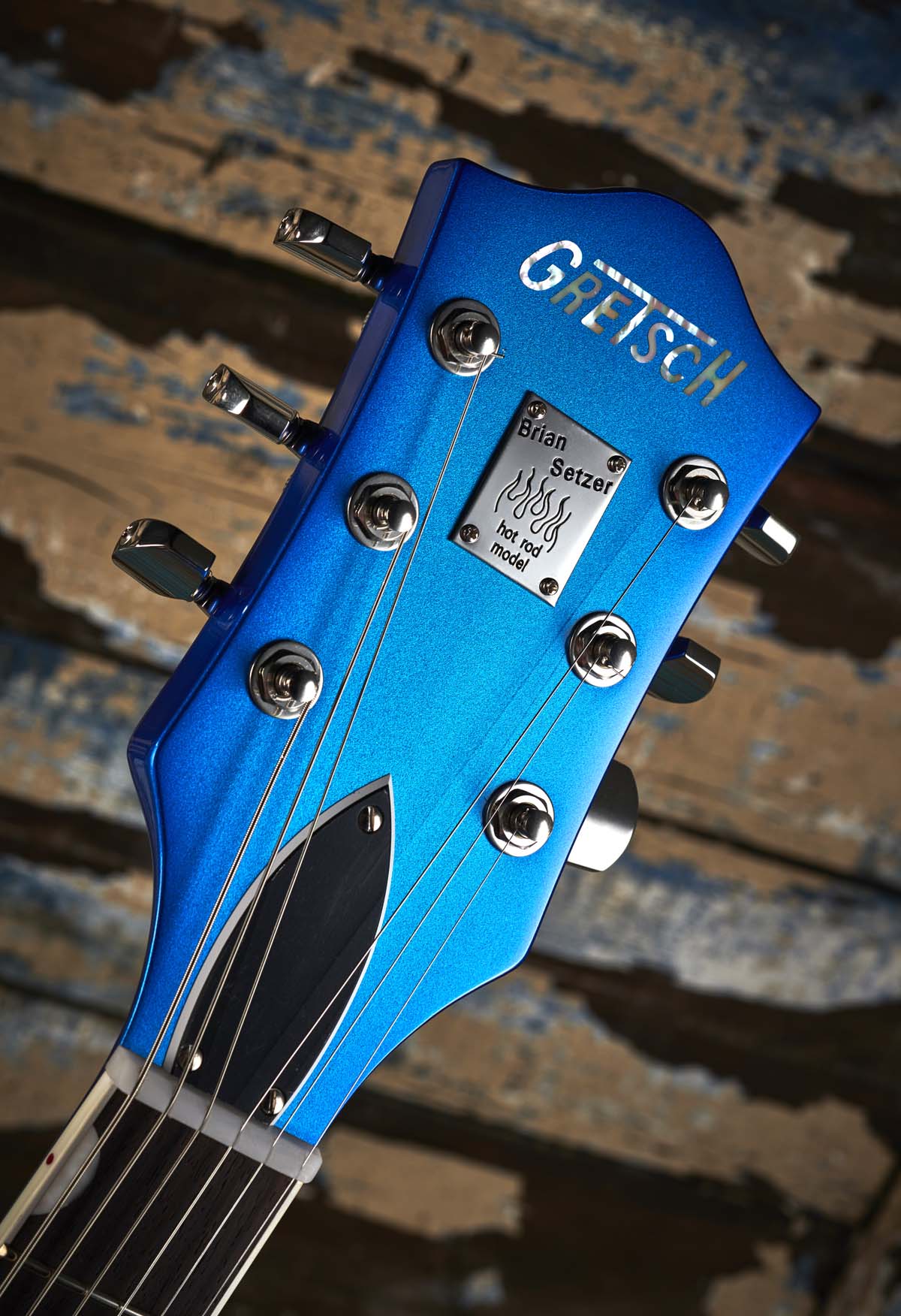
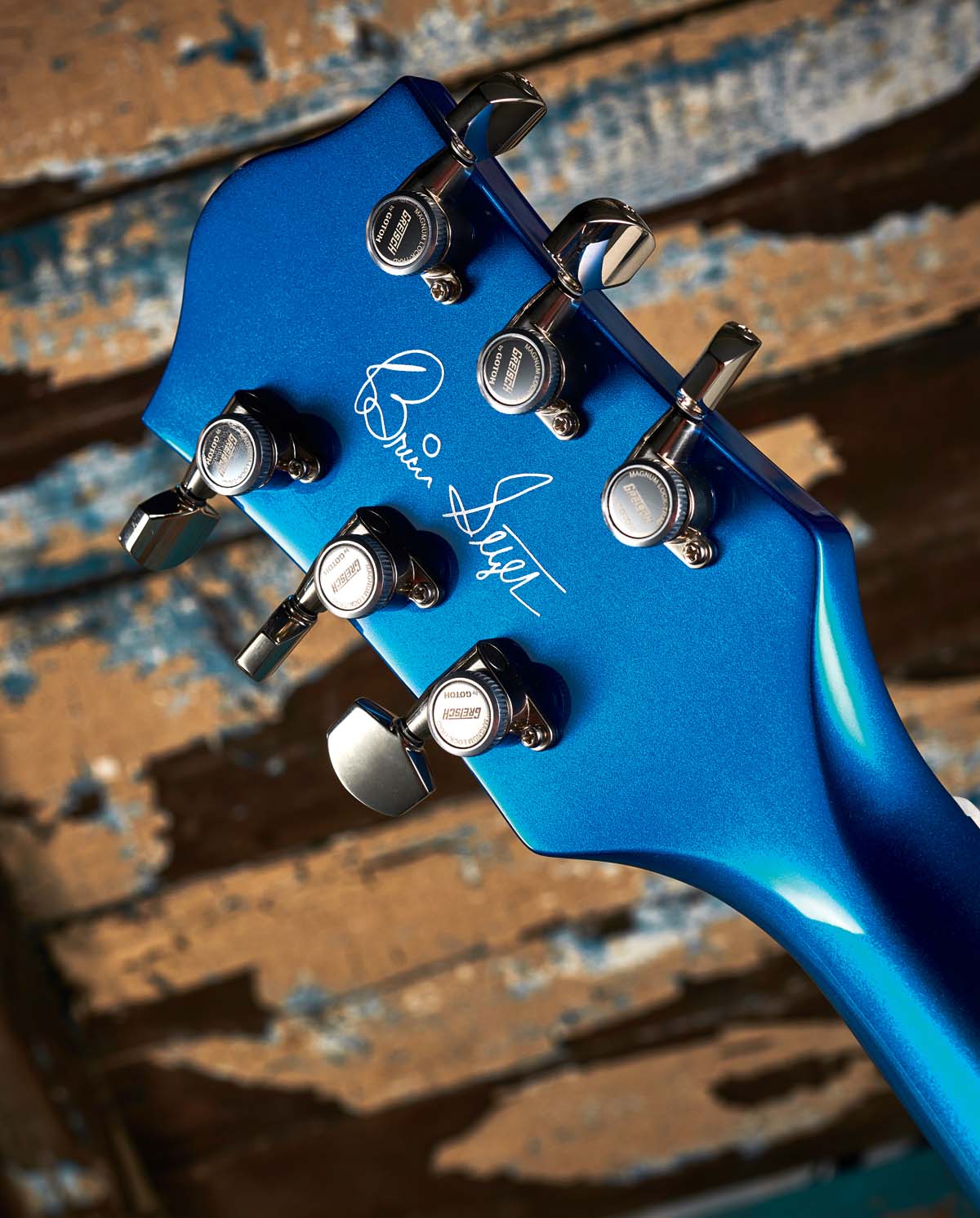
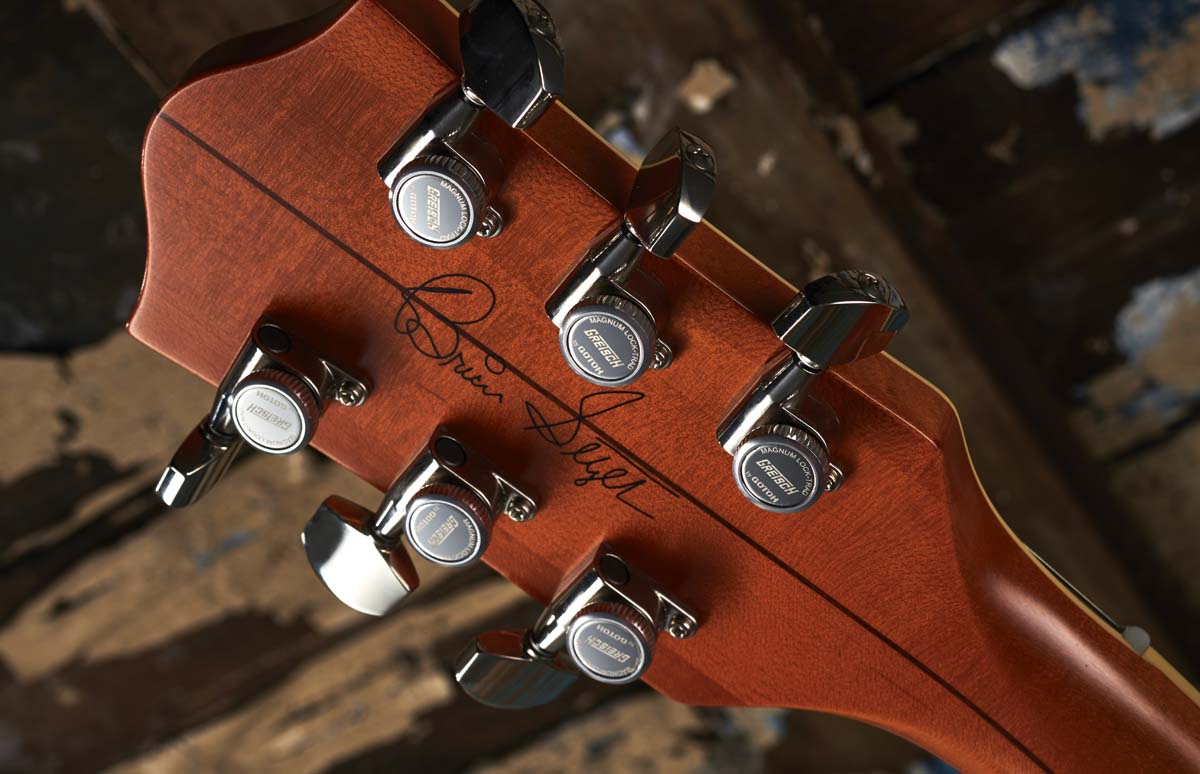
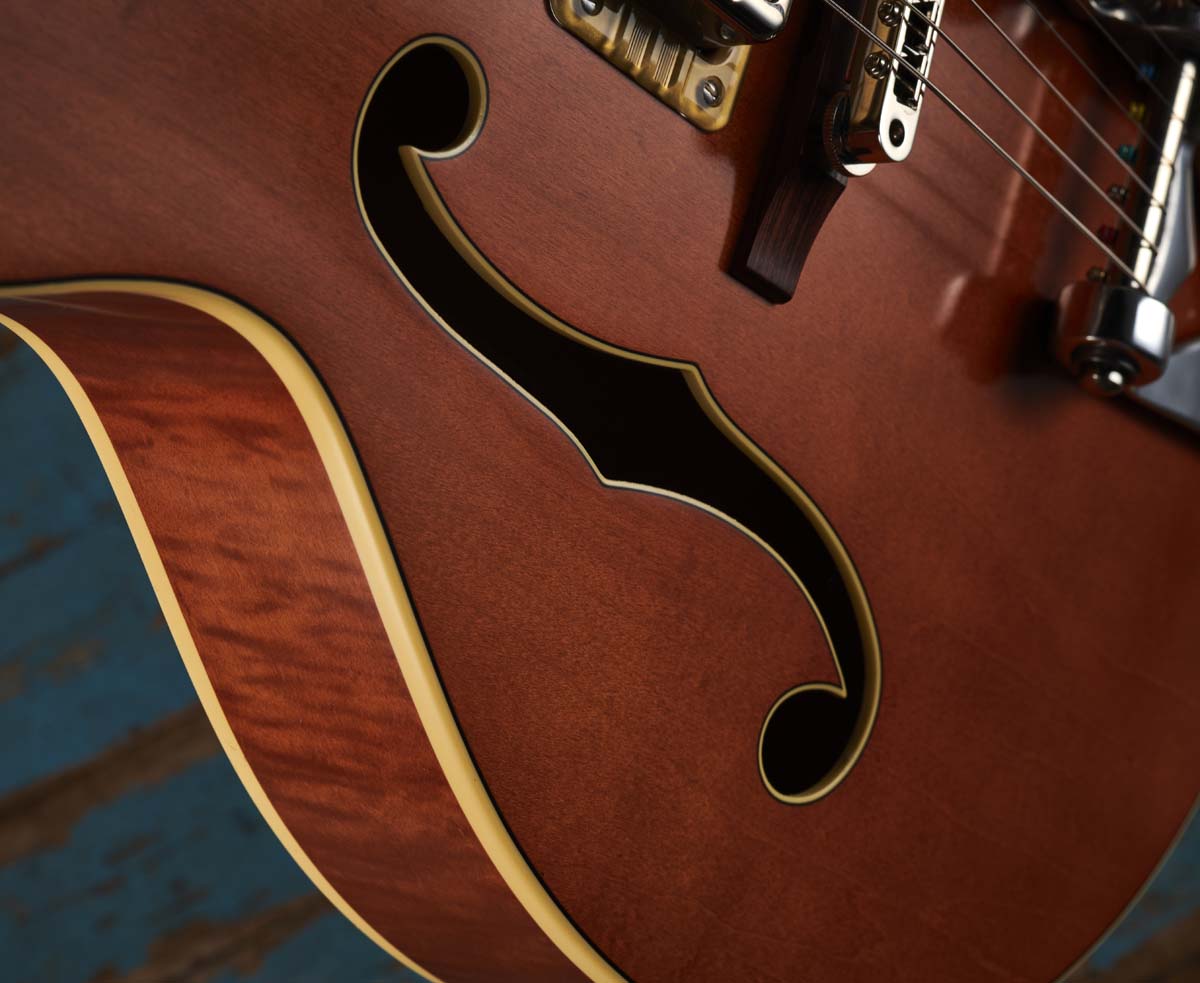
Feel & sounds
For all the eye candy and old-school cool here, the best thing about these new Setzer guitars is the necks. We already spilled the beans on the shared compound radius fingerboards.
What you don’t know is those ’boards are working in cahoots with a V-profile neck. Vital statistics include a depth of around 22.4mm (0.88 inches) at the 1st fret increasing in heft to 25.4mm (one inch) at the 12th fret, just as it begins to morph into the neck heel.
There’s not much in it, but the Hot Rod neck is ever so slightly plumper than the Nashville’s, according to our vernier calipers – possibly due to the Hot Rod’s thicker poly finish?
If the neck depth measurements intimidate you, fear not. The sloping shoulders of the V carve make it easy to handle
The shared V neck profile reminds us of mid-50s Strats and Teles. The V is conspicuous as hell over the first few frets then gently develops into a C shape as you make your way to the 12th fret.
Combined with the compound radius, subtly rounded fingerboard edges and the beautifully finished frets, you’re talking about the most playable G6120 setup yet. The low action helps a lot, too.
If the neck depth measurements intimidate you, fear not. The sloping shoulders of the V carve make it easy to handle.
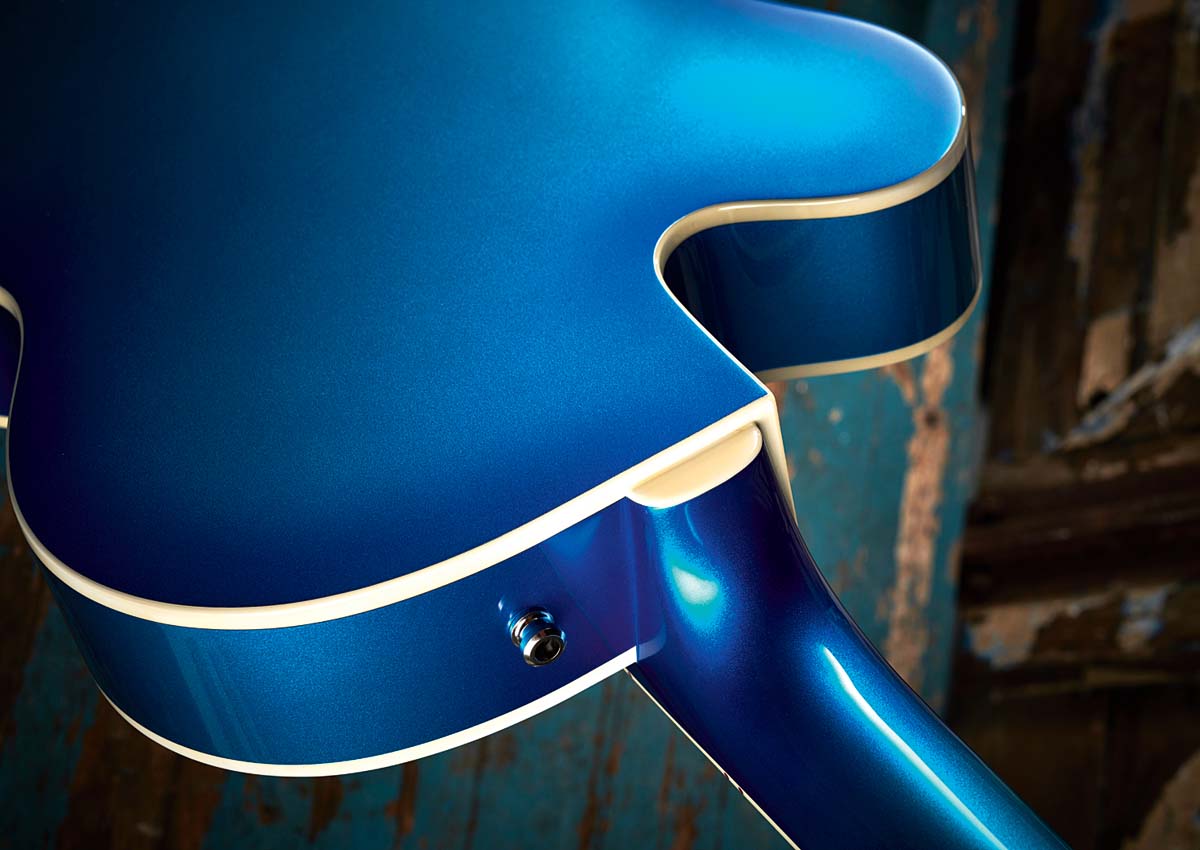
Whenever we review a Gretsch with Filter’Tron pups we always reel off a list of non-rockabilly legends to prove these guitars aren’t the one-trick ponies you might assume they are. Names like Steve Marriott, Pete Townshend and, of course, Malcolm Young.
There, we just did it again. Psychobilly rockers like Jim Heath of Reverend Horton Heat and Tiger Army’s Nick 13 (you know, Mrs 13’s boy) push their Filter’Trons into distortion on occasion. For this review, however, in honour of the man whose name is on the headstocks of the Nashville and Hot Rod, we’re going to stick to the classic rockabilly and country stuff.
The Hot Rod comes with Brian’s Signature TV Jones pickups. The man himself was a fan of the TV Jones Classic for many years. We can hear that ancestry in these coils. There’s just a bit more clarity and bite to our ears.
Adding a merest smidgen of overdrive allows the bridge pickup to bare its teeth a little. It’s still the timeless Gretsch sound across all three positions on the selector switch, only this time it’s more Stray Cat Strut than Summertime Blues.
The top-end is bright yet well rounded. You know that warm treble thing tone geeks go on about? This is it.
Brian could’ve insisted on his signature TV Jones for the Nashville ’59. Instead, he selected Mr Jones’s instant cult-classic, the Ray Butts Ful-Fidelity. While the Setzer Signature pups take you back to the Cats’ classic records, the Ful-Fidelity is the ultimate 88mph DeLorean leap to the 1950s.
Tonally, we’re not that far away from the sound of the much-loved TV Classic. There’s just a bit more of everything. The top-end is bright yet well rounded. You know that warm treble thing tone geeks go on about? This is it.
The bottom strings ring out piano-style and the lower output of these pickups ensures you really catch that airy sound of a hollow laminate maple body. That also translates to a warm clarity in the neck position.
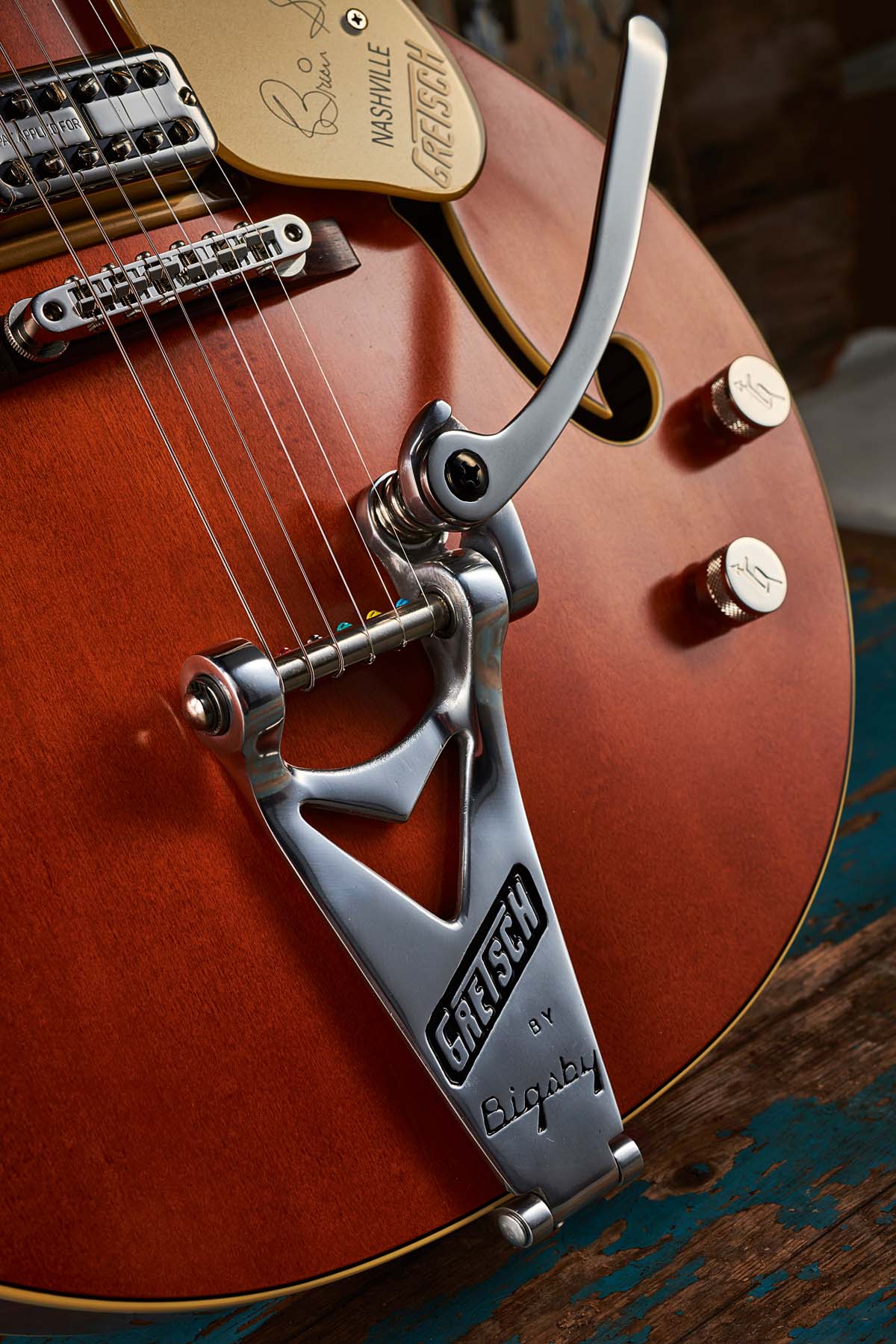
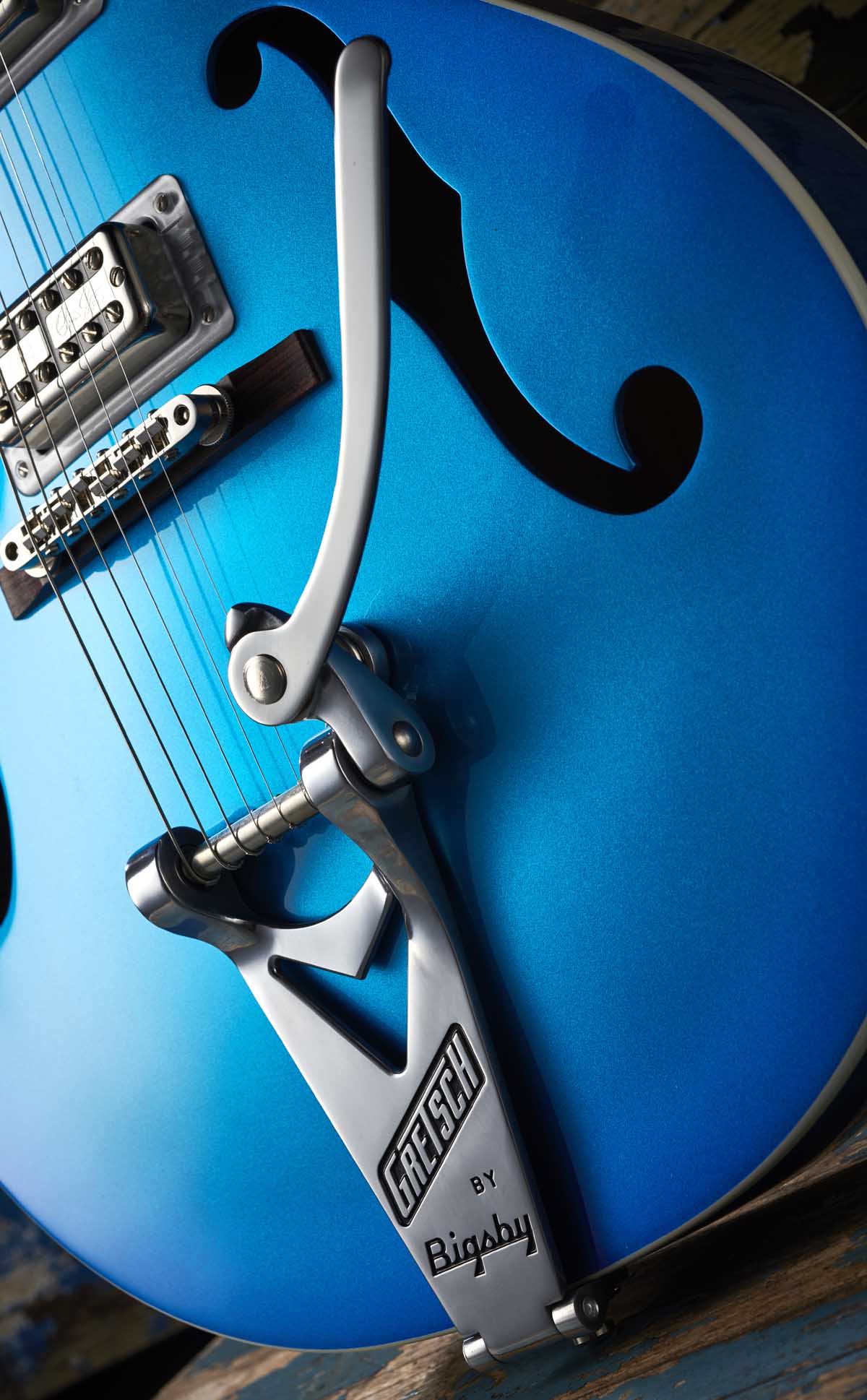
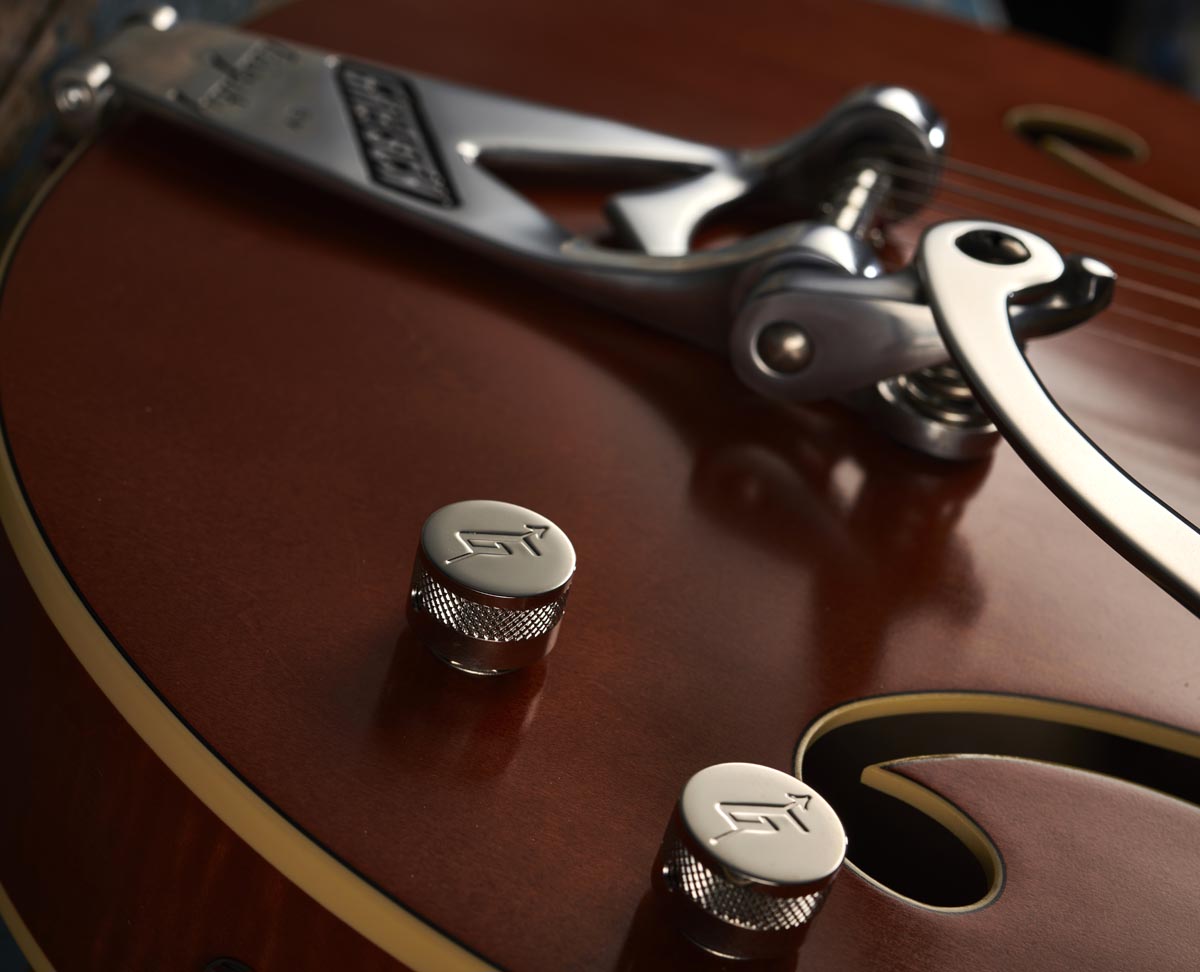

Rockabilly players will likely spend most of their time in the middle position. Like the Hot Rod, you get the right balance of bite and warmth. Here, the Full-Fidelity pups have less bark than the Setzer Signatures, but we like the softer voice for fingerpicking stuff.
Retro cats will also have their own opinion on the ’59’s preset tone switch. We prefer the neutral middle position. The treble roll-off setting is a distant second place for us. Jazzers might be happiest there, but the bass emphasising third position is about as useful as the ‘neck’ sound on a vintage Fender Esquire.
You get the vibe that Brian Setzer wouldn’t put his signature on these guitars if he wasn’t convinced they were the best
Unlike the Setzer pups, the Ful-Fidelity model is not wax potted, so it’s best suited to lower gain settings. This is the pickup for country jazz picking, that meticulous Chet Atkins approach that made him such an influence on people like Brian Setzer and Tommy Emmanuel.
Verdict
When it comes to the reality of owning a vintage G6120, Brian Setzer knows where the bodies are buried. He might love his candy finishes, but the man has never sugarcoated the sheer amount of work he had to out into making his original ‘Stray Cat’ G6120 stay in tune and play right.
“The big problem for me was the zero fret,” he told us last year. “I took a hammer and chisel and just knocked it out and then moved the nut up to where that fret would stand. The pickups were too far away from the strings. I put in folded up matchbooks and screwed the pickups back down. That raised the pickups.”
The pick of the litter for us is the Nashville ’59. We’ve given this guitar 10/10. Why? Well, we really can’t see how Brian and Gretsch can improve on this guitar. It’s by far the best playing example we’ve ever encountered
Yep… 45 years of tweaking (and decades of working with Gretsch to perfect his signature models) all comes down to the new Nashville ’59s and the Hot Rods. The build quality, playability and tone on offer here are exceptional. Figure in the obvious Gretsch curb appeal and they’re pretty much unbeatable. Yes, even at these prices.
As much as we love the Hot Rod, the pick of the litter for us is the Nashville ’59. We’ve given this guitar 10/10. Why? Well, we really can’t see how Brian and Gretsch can improve on this guitar. It’s by far the best playing example we’ve ever encountered and those Ray Butts pickups are beautifully vintage correct.
If we were faced with the choice of playing this Nashville or an original ’59 model, sign us up for the V-shape, compound radius neck. In the words of Mr Setzer: “I’ve got a long list of things you could do if you ever get an old Gretsch. It’s much easier to buy a new one.”
Specs
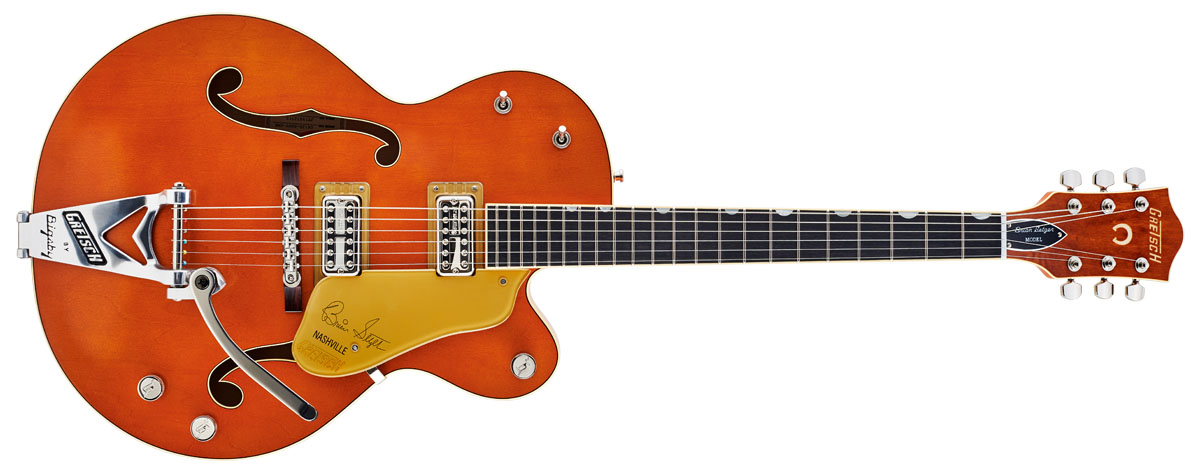
- PRICE: $3,299 / £3,199 (inc. case)
- ORIGIN: Japan
- TYPE: Single-cutaway hollow body electric guitar
- BODY: Laminated top, back and sides with ‘1959’ trestle bracing
- NECK: Maple, glued-in
- SCALE LENGTH: 625mm (24.6”)
- NUT/WIDTH: Bone/42.8mm
- FINGERBOARD: Ebony, pearloid ‘Neo- Classic Thumbnail’ inlays, compound 241-305mm (9.5-12”) radius
- FRETS: 22, medium jumbo
- HARDWARE: Nickel Adjusto-Matic bridge with pinned rosewood base, Bigsby B6C True Vibrato, Gotoh locking tuners
- STRING SPACING, BRIDGE: 53mm
- ELECTRICS: 2x TV Jones Ray Butts Ful-Fidelity humbuckers, 2x volumes, master volume, 3-way tone toggle switch, and 3-way pickup selector toggle switch
- WEIGHT (KG/LB): 3.5/7.8
- OPTIONS: No
- RANGE OPTIONS: G6120T-BSNV Brian Setzer Signature Nashville ’59 Black Lacquer ($2,799 / £2,769)
- LEFT HANDERS: No
- FINISHES: Smoke Orange – semi-gloss nitrocellulose
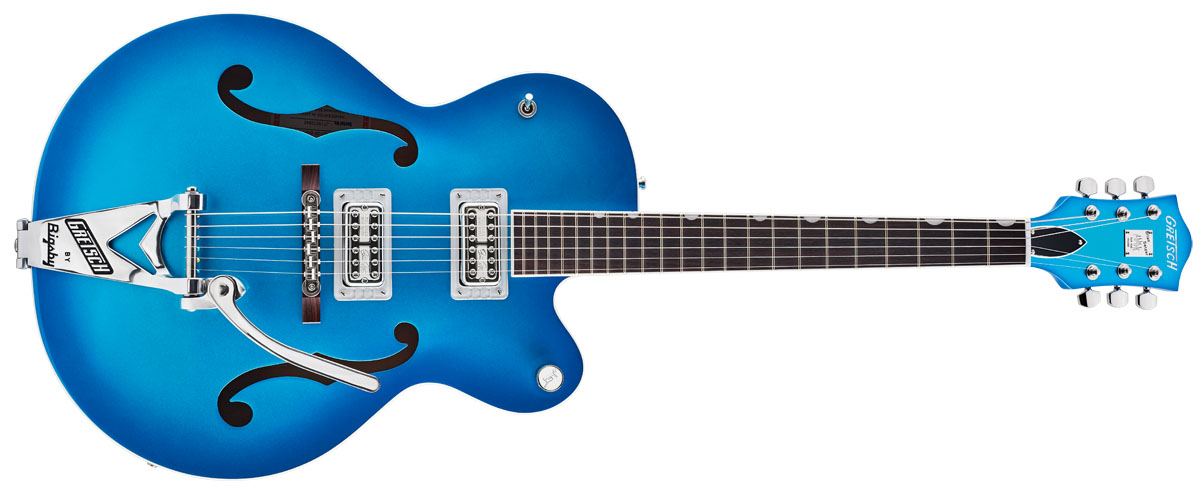
- PRICE: $2,599 / £2,549 (inc. case)
- ORIGIN: Japan
- TYPE: Single-cutaway hollow body electric guitar
- BODY: Laminated top, back and sides with ‘1959’ trestle bracing
- NECK: Maple, glued-in
- SCALE LENGTH: 625mm (24.6”)
- NUT/WIDTH: Bone/42.8mm
- FINGERBOARD: Rosewood, pearloid ‘Neo-Classic Thumbnail’ inlays, compound 241-305mm (9.5-12”) radius
- FRETS: 22, medium jumbo
- HARDWARE: Nickel Adjusto-Matic bridge with pinned rosewood base, Bigsby B6C True Vibrato, Gotoh locking tuners
- STRING SPACING, BRIDGE: 53mm
- ELECTRICS: 2x TV Jones Brian Setzer Signature Filter’Tron humbuckers, master volume, and 3-way pickup selector toggle switch
- WEIGHT (KG/LB): 3.14/6.15
- OPTIONS: No
- RANGE OPTIONS: G6120T-HR Brian Setzer Signature Hot Rod in Lime Gold and Candy Magenta ($2,599 / £2,549); G6120T-HR Brian Setzer Signature Hot Rod in Extreme Coolant Green Sparkle ($2,799 / £2,769)
- LEFT HANDERS: No
- FINISHES: Candy Blue Burst (as reviewed), Lime Gold, Candy Magenta, Extreme Coolant Green Sparkle – all gloss
- CONTACT: Gretsch Guitars
Ed Mitchell was Reviews Editor on Total Guitar magazine from 2003, and his guitar-modding column, Ed’s Shed, appeared in print on both sides of the Atlantic (in both Total Guitar and Guitar World magazines). He was the Editor of The Blues Magazine from 2012-16, and a contributor to Guitarist, Classic Rock and Louder. He died in October 2022, aged 52. Between them, the websites Guitar World, Louder and MusicRadar host over 400 of his articles – among them interviews with Billy Gibbons, Paul Weller, Brian Setzer, profiles on Roy Buchanan, Duane Allman and Peter Green, a joint interview with Jimmy Page and Jack White, and dozens of guitar reviews – and that’s just the ones that made it online.


